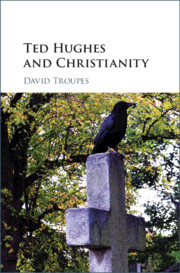Book contents
- Ted Hughes and Christianity
- Ted Hughes and Christianity
- Copyright page
- Dedication
- Epigraph
- Contents
- Acknowledgments
- Abbreviations
- Chapter 1 The Deeper Life
- Chapter 2 The Biological Fall
- Chapter 3 The Biblical Fall
- Chapter 4 The Crucifixion
- Chapter 5 Puritanism and the Goddess
- Chapter 6 Sacrament and Transcendence in River
- Chapter 7 Sylvia Plath: Being Christlike
- Afterword: Glimpses
- Bibliography
- Index
Chapter 1 - The Deeper Life
Published online by Cambridge University Press: 17 June 2019
- Ted Hughes and Christianity
- Ted Hughes and Christianity
- Copyright page
- Dedication
- Epigraph
- Contents
- Acknowledgments
- Abbreviations
- Chapter 1 The Deeper Life
- Chapter 2 The Biological Fall
- Chapter 3 The Biblical Fall
- Chapter 4 The Crucifixion
- Chapter 5 Puritanism and the Goddess
- Chapter 6 Sacrament and Transcendence in River
- Chapter 7 Sylvia Plath: Being Christlike
- Afterword: Glimpses
- Bibliography
- Index
Summary
This introductory chapter opens with a look at Frances Bacon’s Three Studies for a Crucifixion, which a 32 year-old Hughes describes in a letter. His fascination with this painting leads us to basic questions about Hughes’s attitude toward religious thought and language. This begins with the problem of the word “God”: what the word means, how theologians use it, and how Hughes uses it in the poetry of his first two books. This leads to a summary of the existing critical consensus on Hughes’s relationship with Christianity, and opening remarks in preparing a refutation of this consensus. Moving on to Hughes’s third book, Wodwo, discussion focuses on the poem “Logos,” where the superficial cultural mockery of Hughes’s earlier “God” poems begins to mature into a more genuine engagement with the concepts of God and Christ, albeit an engagement fuelled by persona-driven irony, gesturing toward the Crow project.
- Type
- Chapter
- Information
- Ted Hughes and Christianity , pp. 1 - 23Publisher: Cambridge University PressPrint publication year: 2019

